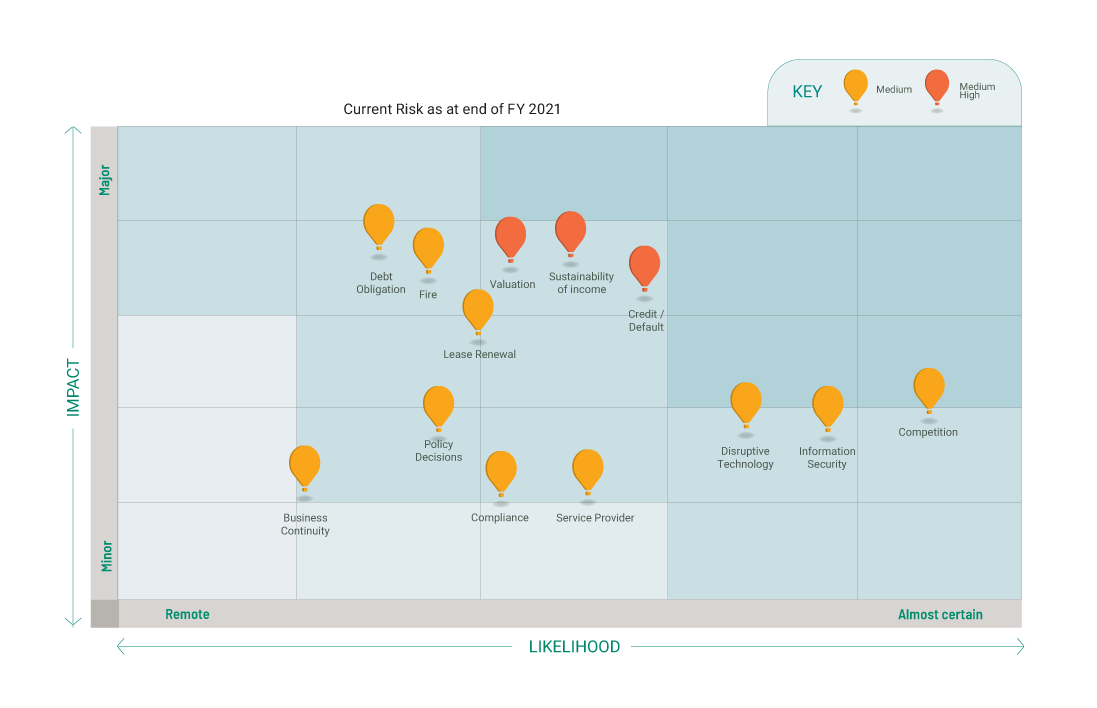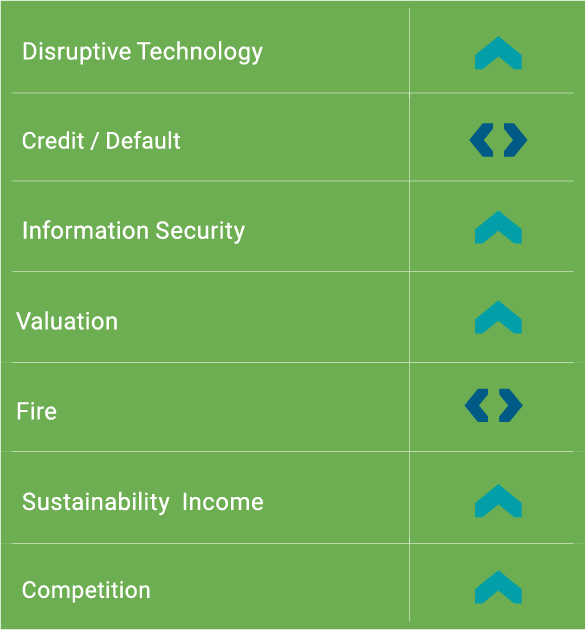Risk Management
Dealing with the unforeseen
- Home
- Risk management
Risk Management
Report
Risk Report
The retail business has been evolving over the past decades, accentuated by the evolution and development of digital technologies. Almost all parts of the world have witnessed changes in consumer behaviour and the nature of retail. Hence the reshaping of the retail landscape, for instance retail platforms powered by digital technology had to be adapted quickly, and it is expected to continue to support this change as consumers and retailers adjust to new normality.
During the year, the management team has demonstrated agility and proactivity in its strategic response to the risks faced in a period of uncertainty. The level of consumption contracted in the short-term and in view of a challenging economic context over the last financial year and foreseeable future, Ascencia has achieved a resilient performance by proactively managing their risks.
The Company was well prepared to navigate through the second COVID-19 national lockdown impacting the retail sector. The main strategic responses, measures taken and achievements during the financial year to mitigate the current risks, as well as opportunities seized were:
- Ascencia has successfully raised funds through a bond issue as a response to the funding risk.
- Successful negotiations for a Metro Station in Phoenix mall was an opportunity seized in the face of a decreasing footfall due to inconvenient road access to the mall.
- A second tenant relief plan was provided to the valued tenants to bear the burden of the second national lockdown.
- The launching of Decathlon and 42 Market Street increased the attractiveness of Bagatelle Mall.
- Several sanitary measures were taken to reinforce the safety for tenants, shoppers and visitors in the malls. The COVID-19 certification (Safe Asset Group) has been obtained for Bagatelle mall.
- The migration of the Company to the main stock exchange market in August 2021.
The clear strategy put in place through the above strong responses to the risks has created value and preserved the interest of various stakeholders such as shoppers, tenants, shareholders, strategic partners, providers of finance and service providers. The result for the financial year reflects the effectiveness of the measures taken.
Risk Management Framework
The Risk Management Framework and process is as follows:
The two main service providers namely EnATT Ltd (the Property & Asset Manager) and Rogers & Company Ltd (the Fund Manager) are responsible for risk management on a day to day basis. Risks related to the main service provider which may impact Ascencia are reviewed and reported to the Risk Management and Audit Committee (RMAC).
Other service providers are contracted for the management of certain specific risks.
The risk management framework has been reviewed with the following objectives:
- Ensuring increasing effectiveness in the monitoring and reporting of risks on a regular basis.
- Staying on course and fostering stability.
The Fund Management team has been consolidated with the recruitment of additional capabilities with a view to play a more important role in ensuring effectiveness of risk management. The new framework indeed provides more clarity in these times of uncertainty.
Effectiveness of the risk management process
The risk management process was evaluated and the factors assessed were:
- Ability to identify and anticipate risks.
- Ability to respond to risks.
As risks identified are assessed, mitigating measures are taken promptly. Additional controls are put in place and where necessary, policies and procedures are amended or written and communicated to ensure clarity.
Where risks are beyond the tolerable level of our intervention and control, they are alleviated by due process and monitoring and further transferred through appropriate insurance covers.
Principal Risks
The heat map below depicts Management’s assessment of the residual risks impacting Ascencia at the end of the financial year and anticipation of
the evolution of those risks over the next three years.

Evolution of Risks over the next 3 years
Our estimate of the evolution of the significant residual risks over the next three years amidst lots of uncertainties is as follows:

Emerging Risk
Climate Change
Climate change is a risk to the business in as much as it challenges the
Company’s resilience to its effects. Increasingly, the impacts of climate
change are placing pressure on businesses to both minimize the impact,
as well as ensure their future operating model is green and sustainable
while remaining relevant as consumers shift behaviours to minimise their
carbon impact.
At Ascencia, management has already taken several green initiatives such
as the installation of rooftop photovoltaic farm, recycling of waste and
used oil, use of green products, energy consumption schemes and LEED
certification. These initiatives are clear opportunities tapped by
management to mitigate the risks.
Risk Governance
Risk Management and Audit Committee
The Risk Management and Audit Committee (“RMAC”) has constantly played a key oversight role for the Board of Directors during the year.
The committee’s responsibilities include the following:
- Provide that risks are reviewed and managed to an acceptable level in the business;
- Regularly ensure that all internal systems and procedures are designed to provide ongoing assurance that the assets are safeguarded; and
- Monitor transactions and make sure they are executed and recorded in accordance with the Company’s policy.
Five committee meetings were held during the year, and the key areas of focus were as follows:
Looking Ahead
Ascencia has shown resilience to the challenges posed by the Covid-19 crisis. The pandemic is not over yet, the impact of the outbreak remains uncertain, and may be substantial and pervasive. Recovery depends on several factors amidst the level of vaccination and economic conditions.
The Company has made progress in terms of risk maturity. Management has demonstrated capacity for anticipation of risks, implementation of plans and integration of risk with strategy. At Ascencia, Risk Management is at the heart of the activities. Continued focus on strengthening the current robust risk management framework and risk governance will play an important role in the next financial year to foster stability and enable the company to stay on course despite the challenging conditions prevailing.